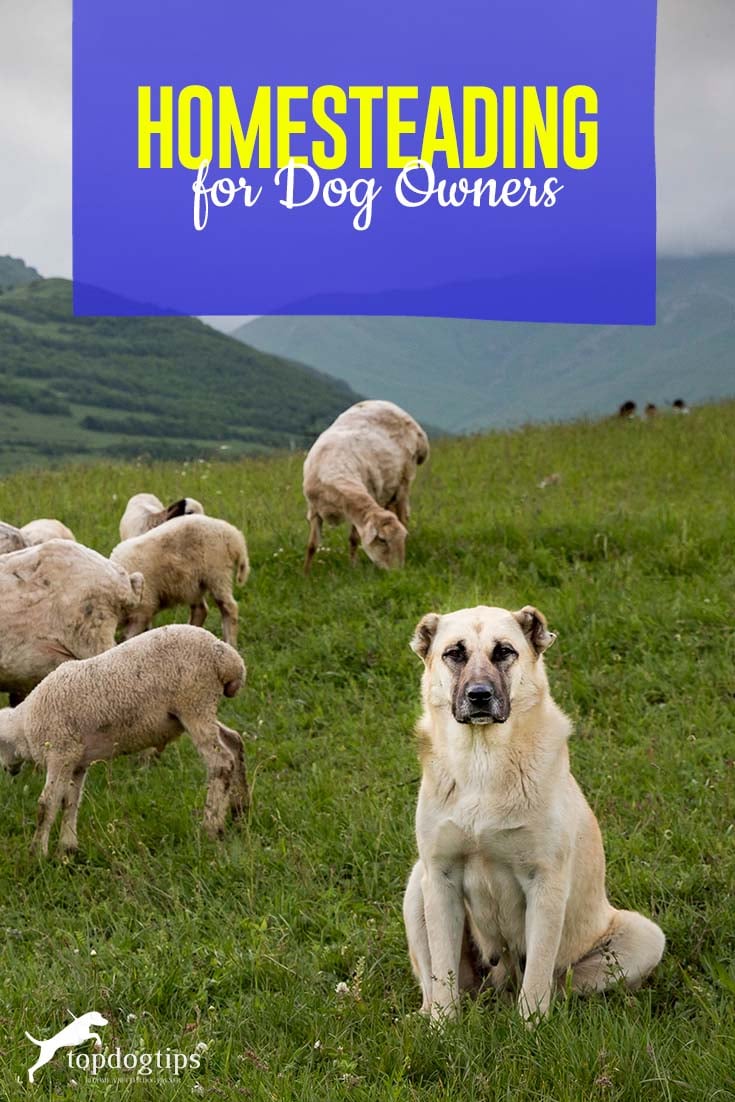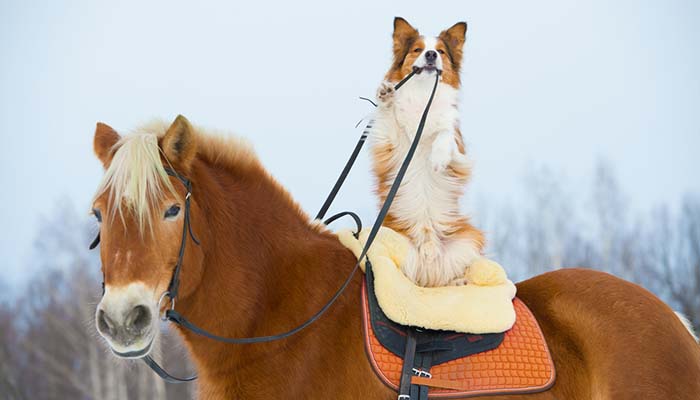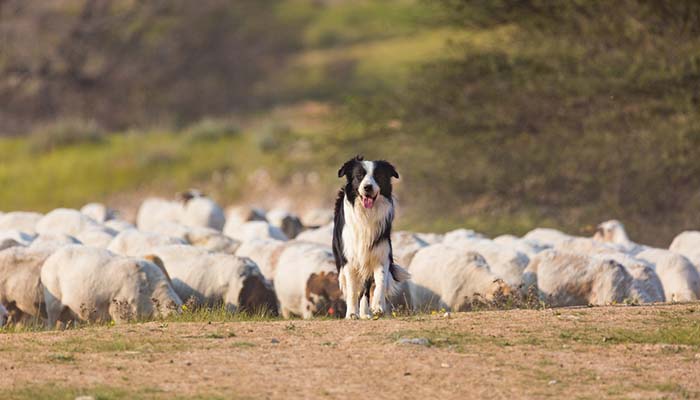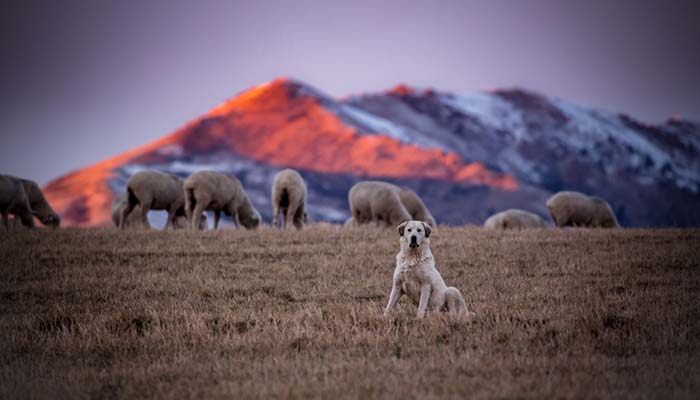Since people are becoming more aware of the harmful effects of mass production of meat and dairy, some of them are leaving behind the normal city lifestyle. Homesteading is a great way to live more freely and enjoy life at a different pace. Along with chickens, cows, pigs, and other agricultural animals, dogs are just a part of the experience.
Whether you’ve got a dog already, or you’re looking to get one specifically for your homestead, there are some things you should keep in mind.
1. Protect Your Chickens
Since dogs have an instinctual prey drive, some breeds more than others, it’s only natural for some dogs to want to chase chickens and other small animals that you may have on your homestead. Sometimes they go a little too far and end up killing your fowl.
Give your hens a good sized, fenced off area where your dog won’t be able to dig under, or jump over it. Ideally, it’s best to set up a roof for your chickens to protect them from predatory animals anyway. Chickens are known as “birds of prey,” and they’re hunted by everything from snakes to other birds. It’s no wonder why some canines might also be interested in them.
2. Keep Your Dog Out of Neighboring Properties
Possibly the greatest part of having your own little patch of land is that you can let your dog roam free. Sadly, some dogs roam too far and end up in a neighbor’s yard, and can even be tragically shot. Generally, the law works in neighbor's favor if your pup is on someone else's property.
Before you move in, or bring a dog, see if it’s possible to get to know your neighbors a little better. At the very least, try to let people know that you do have a dog and give a description. That way they won’t assume it’s a stray if your pet does happen to escape from your yard.
3. Your Dog May Dig Up Your Garden Without a Barrier
We all know how much dogs love to dig, and it’s usually not a desired trait among most pets owners. This is especially true when the garden you’re tending is meant to provide you and your family with food for the coming weeks. However, when your pup sees you digging up dirt and keeping all the fun to yourself, they just can’t help themselves.
As you would with your hens, give your garden its own, special closed-off space where other animals can’t get to it. Not only because of digging, but also because some garden plants can be toxic to dogs. Certain kinds of pesticides can also be harmful to your pet, so try to use organic sprays that won’t hurt your pooch if they do happen to dig up your vegetables.
4. Your Dog Needs a Job to Do
While it’s great that they have more space to run than they would in a regular yard, your pup still needs a purpose. Genetically active and working dog breeds like the Australian Cattle Dog are self-explanatory, they need to herd, or be given work that tires them out.
“Nose work” is another way to give your working dog a challenging task. This can be anything from teaching them to retrieve game or finding a runaway pig.
5. Younger Dogs Require More Training
While some people feel like it’s better to get a new pup that can grow with the family, they don’t realize how much work goes into training. After tending to a garden, agricultural animals, and other work that needs to be done, you probably won’t have the energy for much else.
Many prefer adopting a young purebred puppy for their homestead, but remember that a matured rescue mutt is just as smart, capable, and far more likely to listen to you. They don’t go through a teething phase, and they have more control over their impulses.
6. What You Really Need in a Homesteading Dog
We all have our own reasons for wanting a dog: they provide us with companionship, protection, and teach children about responsibility. There is a golden rule about getting a dog that “fits your lifestyle,” not the other way around. So before you adopt a dog for your homestead, think about why you’re getting one.
If you’re a laid back person who just wants to breeze through chores and spend the rest of the day reading or fishing, an active pet is not for you and couch potato dogs might be better. Basset Hounds, Greyhounds, and older dogs in general don’t require as much exercise or attention. They’re happy to accompany you as you make your way through the day, and find ways to keep themselves entertained, or just chill.
Get a dog that suits your needs and fits well in your homesteading lifestyle from the beginning; that way you’ll be less stressed about having to spend extra time for their care, and they’ll be able to have a happier and well-fitted forever home.
7. Your Dog May Need to Be Groomed More Often
Homesteaders generally like to spend a lot of time outdoors, and their dogs enjoy this luxury as well. Being outside more often also means that your pet is also exposed to more of the elements, and to pests. Long haired Shepherd breeds will need to be brushed and bathed more often than they would in a regular home.
You’ll also need to check their ears, toes, nose, and jowls regularly for things like ticks, fleas and Asian lady beetles. This is especially important if you do intend to allow your pupper to run freely through heavily wooded areas and tall grasses.
8. Look Out for Wild Animals
You and your dog may be safer than you would be from the average burglar in the city, but the country offers a whole new set of hazards. Farm life also means that your whole family is more exposed to predatory animals, not just your chickens.
Bobcats, bears, coyotes, wolves, and a number of other creatures could be inhabiting the same patch of land that you happen to be living on. Coyotes in particular have been the biggest problem for many homesteaders, and these animals come at night not only to kill chickens but also smaller dogs.
Even if you have a Great Pyrenees who will be a good match for a coyote, it’s unlikely that they’ll be able to fight off a bear. So it’s probably best to make sure that wherever your pet roams, they’re within your sight or you know the territory well enough. If you want to let them out while you’re busy doing other things, it’s better to use a fenced off yard.
READ NEXT: 20 Farm Dog Breeds for Living in the Country

















